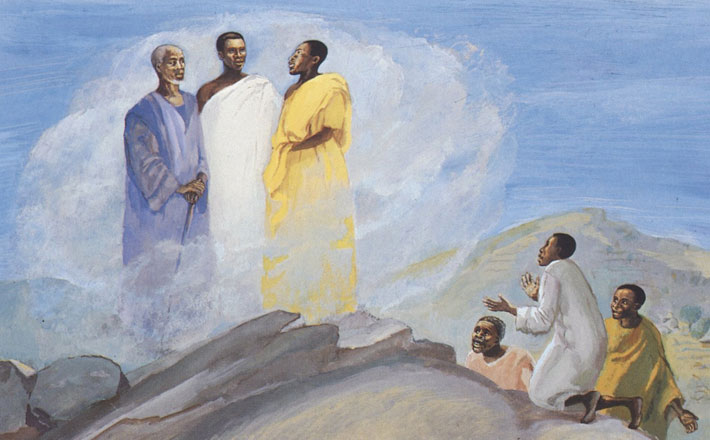Commentary on 2 Corinthians 4:3-6
The transfiguration of Christ entails seeing Jesus as nothing short of God’s glory.
For Paul, to see Christ in this manner is to see God’s good news for the whole world. Seeing is believing. Unfortunately, not all are able to see this good news.
The veiling of God’s good news
Our reading this week begins with a stinging acknowledgement that the gospel is veiled to “those who are perishing.”
The dichotomy between “those who are being saved” and “those who are perishing” echoes Paul’s previous correspondence to the Corinthian church. In 1 Corinthians 1:18, the apostle writes, “For the message about the cross is foolishness to those who are perishing, but to us who are being saved it is the power of God.” There, the dichotomy served to remind the church that those who are being saved are called to act not by the world’s wisdom, but according to the cross.
The argument in 2 Corinthians recalls this earlier letter. According to 2 Corinthians 2:15, the apostle bears witness to Christ both among those who are being saved and among those who are perishing. Plus, there is a reminder of the transparency and sincerity of his intentions to preach God’s good news (2 Corinthians 1:12; 4:1-2; cf. 1 Corinthians 2:1-5).
Paul claims that he is not the one veiling God’s message, but the “god of this age” has blinded unbelievers (2 Corinthians 4:4; cf. 1 Corinthians 2:6). It is certainly not uncommon for Paul to refer to this age (e.g., 1 Corinthians 2:6; Galatians 1:4) or to other powers (see e.g. 1 Corinthians 8:5; 10:20-21). In Romans 8:31-39, Paul expresses the good news that nothing — neither anti-God powers nor the sufferings of this world — will ultimately separate us from God’s love.
This good news, however, is veiled to those who are perishing. The concepts of death and veiling build on the previous argument in 2 Corinthians 3. Paul has referred to the giving of the law as a “ministry of death” (2 Corinthians 3:7) and a “ministry of condemnation” (2 Corinthians 3:9). Paul’s view of the law in 2 Corinthians 3 fits nicely with what the apostle has argued elsewhere. According to Galatians 3:21, the problem with the law is that it cannot provide life. The law serves to point out sin, not to vanquish it (Galatians 3:19; Romans 7:7-12). The law demonstrates the pervasive power of sin, and the wages of sin is death (Romans 6:23). The holy and just law serves as a tutor (Galatians 3:24), but it was never intended to provide victory over death. Thus, Paul can say in 2 Corinthians 3:6 that the letter kills.
Although the “ministry of death” or “condemnation” stands in contrast to a ministry that brings life (2 Corinthians 3:6), both the law and Christ are linked to God’s glory. Paul does not denigrate the law, but acknowledges its limitations. Those limitations continue to exist even in the reading of the law, since a veil covers the mind of the hearer (3:14).
In Christ, the veil is set aside (2 Corinthians 3:14). Christ embodies God’s glory. In Christ, Paul has seen the abundant life that God wants for all creation. Paul likens the glory of Christ to the very image of God (4:3).
This revelation has changed how Paul has viewed even the holy and just and good law (see Romans 7:12).
For Paul’s argument to make sense, one must imagine the argument backwards. With Christ, Paul sees God’s glory as he has never seen it before. It is as though the law turned on a flashlight in the darkness, but Christ has shone daylight. After seeing the world with the light of the sun, the limitations of the flashlight, though a wonderful tool, are obvious. The law — though a gift of God — could only provide fleeting light of glory. If the law, with all its limitations, brought glory that was fleeting, how much more glory will abound by seeing Christ (2 Corinthians 3:9-11)! While the law produced glory that fades, seeing Christ results in glory that grows as the witnesses are being transformed into Christ’s likeness (2 Corinthians 3:18).
Servants for Christ’s sake
For Paul, the revelation of God’s image through Jesus has changed everything. The revelation of God’s glory in Christ is the basis of Paul’s confession of Jesus’ Lordship (2 Corinthians 4:5). That revelation also is the driving force behind Paul’s entire ministry. In Jesus, Paul sees that God is indeed making all creation “new.” Jesus embodies God’s desire of life abundant for all. God has not abandoned God’s creation to the “god of this age.” This is good news indeed.
Paul’s life has been transformed by this news. In 2 Corinthians 4:5, Paul declares that he and his co-workers are servants for Jesus’ sake. As a servant, Paul will endure hardships — flogging, imprisonment, mobbed, overworked, sleepless, and starving (2 Corinthians 6:4-5). Paul’s willingness to suffer for the sake of spreading the gospel stems from his conviction that Christ’s love is for all (2 Corinthians 5:14-15).
Let the light shine
If Christ is the transformative light of the world, then why isn’t the whole world transformed by God’s glory? The bad news is that the “god of this age” has not given up. Rather, this false god is actively hindering the Lord’s light from shining in a dark world. Paul himself has faced many obstacles in trying to share this light. Indeed, Paul’s exhortation to the church demonstrates that sometimes “those who are being saved” also fail to bear witness to that light.
As we teach and preach from 2 Corinthians in honor of our Lord’s transfiguration, perhaps we should ask ourselves in what ways we might be complicit in the veiling of God’s light in our world. Fortunately, God chose us — the weak and fragile vessels that we are (2 Corinthians 4:7) — to display God’s glory. That glory is transforming us and molding us into Christ’s image. The good news is that God’s light will not be overcome by darkness.


February 15, 2015